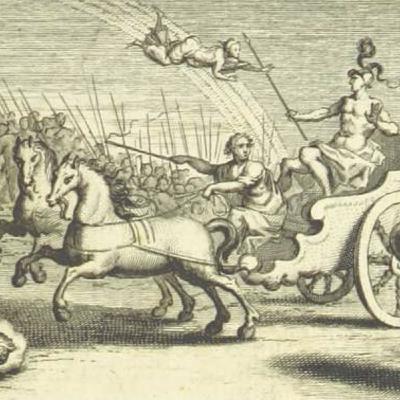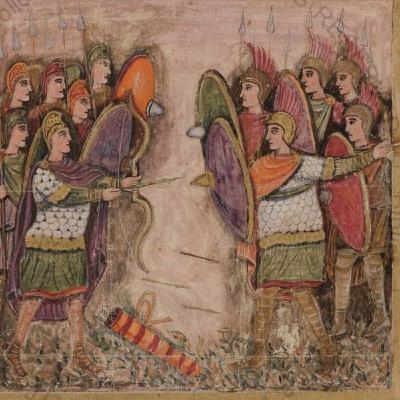S1 Ep84: SHOW 11-12-25 CBS EYE ON THE WORLD WITH JOHN BATCHELOR THE SHOW BEGINS IN THE DOUBTS ABOUT CHINA'S LEADERSHIP. FIRST HOUR 9-915 Allied AI Competition and Submarine Requests. Scott Harold examines the crucial role of allies Japan and South Korea in t
Update: 2025-11-13
Description
SHOW
11-12-25
CBS EYE ON THE WORLD WITH JOHN BATCHELOR
1930
THE SHOW BEGINS IN THE DOUBTS ABOUT CHINA'S LEADERSHIP.
FIRST HOUR
9-915
Allied AI Competition and Submarine Requests. Scott Harold examines the crucial role of allies Japan and South Korea in the AI competition against China. Japan is developing locally tailored AI models built on US technology for use in Southeast Asia. South Korea aims to become the third-largest AI power, offering reliable models to counter China's untrustworthy technology. Harold also discusses South Korea's surprising request for nuclear-powered, conventionally armed submarines to track Chinese and North Korean vessels, signaling a greater public willingness to contribute to China deterrence.
915-930
Rare Earths Monopoly and US Strategy. General Blaine Holt discusses China's challenge to the US and its allies regarding rare earths, noting that China previously threatened to cut off supply. The US is securing deals with partners like Australia and is on track to replace China entirely, despite initial processing reliance on Chinese predatory practices. Holt suggests a two-year recovery is conservative, as technology for domestic processing exists. He also notes China's leadership is in turmoil, trying to buy time through trade deals.
930-945
Russian Economic Stagnation and War Finance. Michael Bernstam confirms that the Russian economy is stagnating, expecting no growth for years due to exhausted resources and reliance on military production. Oil and gas revenues are down significantly due to Western sanctions and high discounts, widening the budget deficit. Russia is increasing taxes, including the VAT, which drives inflation in staples. This economic pain damages the popularity of the war by hurting the low-income population—the primary source of military recruitment.
945-1000
Buckley, Fusionism, and Conservative Integrity. Peter Berkowitz explores William F. Buckley's consolidation of the conservative movement through "fusionism"—blending limited government and social conservatism. Buckley purged the movement of anti-Semites based on core principles. Berkowitz uses this historical context to analyze the controversy surrounding Tucker Carlson giving a platform to Nick Fuentes, who openly celebrates Stalin and Hitler. This incident caused division after the Heritage Foundation's president, Kevin Roberts, defended Carlson, prompting Roberts to issue an apology.
SECOND HOUR
10-1015
Commodity Markets and UK Political Instability. Simon Constable analyzes rare earth markets, noting China's dominance is achieved through undercutting prices and buying out competitors. Prices for key industrial commodities like copper and aluminum are up, indicating high demand. Constable also discusses UK political instability, noting that Labour Prime Minister Keir Starmer lacks natural leadership and confidence. The major political driver for a potential leadership change is the party's broken promise regarding income taxes, which severely undermines public trust before the next election,
1015-1030
Commodity Markets and UK Political Instability. Simon Constable analyzes rare earth markets, noting China's dominance is achieved through undercutting prices and buying out competitors. Prices for key industrial commodities like copper and aluminum are up, indicating high demand. Constable also discusses UK political instability, noting that Labour Prime Minister Keir Starmer lacks natural leadership and confidence. The major political driver for a potential leadership change is the party's broken promise regarding income taxes, which severely undermines public trust before the next election
1030-1045
Austrian Economics, Von Mises, and the Fight Against Interventionism. Carola Binder discusses the Austrian School of Economics, highlighting its focus on free markets and Ludwig von Mises's opposition to government "interventionism," including rent and price controls. Mises argued these policies distort markets, leading to shortages and inefficiency. Binder emphasizes Mises's belief that economic literacy is a primary civic duty necessary for citizens to reject socialism and interventionist panaceas, especially as new generations are exposed to such ideas.
1045-1100
Austrian Economics, Von Mises, and the Fight Against Interventionism. Carola Binder discusses the Austrian School of Economics, highlighting its focus on free markets and Ludwig von Mises's opposition to government "interventionism," including rent and price controls. Mises argued these policies distort markets, leading to shortages and inefficiency. Binder emphasizes Mises's belief that economic literacy is a primary civic duty necessary for citizens to reject socialism and interventionist panaceas, especially as new generations are exposed to such ideas.
THIRD HOUR
1100-1115
Philippine Missile Deployment to Deter China. Captain Jim Fanell reports that the Philippines unveiled its first operational BrahMos anti-ship cruise missile battery in western Luzon to deter Chinese aggression. This supersonic missile system, part of the $7.2 billion Reorizon 3 modernization program, gives the Philippines "skin in the game" near disputed waters like Scarborough Shoal. The deployment signifies a strategy to turn the Philippines into a "porcupine," focusing defense on the West Philippine Sea. The systems are road-mobile, making them difficult to target.
1115-1130
AI, Cyber Attacks, and Nuclear Deterrence. Peter Huessy discusses the challenges to nuclear deterrence posed by AI and cyber intrusions. General Flynn highlighted that attacks on satellites, the backbone of deterrence, could prevent the US from confirming where a launch originated. Huessy emphasizes the need to improve deterrence, noting that the US likely requires presidential authorization for retaliation, unlike potential Russian "dead hand" systems. The biggest risk is misinformation delivered by cyber attacks, although the US maintains stringent protocols and would never launch based solely on a computer warning.
1130-1145
Sudan Civil War, Global Proxies, and Nigerian Violence. Caleb Weiss and Bill Roggio analyze the civil war in Sudan between the SAF and the RSF, noting both factions commit atrocities, including massacres after the capture of El Fasher. The conflict is fueled by opposing global coalitions: the UAE and Russia support the RSF, while Iran, Egypt, and Turkey back the SAF. The Islamic State has called for foreign jihadis to mobilize. Weiss also addresses the complicated violence in Nigeria, differentiating jihadist attacks on Christians from communal farmer-herder conflict.
1145-1200
Sudan Civil War, Global Proxies, and Nigerian Violence. Caleb Weiss and Bill Roggio analyze the civil war in Sudan between the SAF and the RSF, noting both factions commit atrocities, including massacres after the capture of El Fasher. The conflict is fueled by opposing global coalitions: the UAE and Russia support the RSF, while Iran, Egypt, and Turkey back the SAF. The Islamic State has called for foreign jihadis to mobilize. Weiss also addresses the complicated violence in Nigeria, differentiating jihadist attacks on Christians from communal farmer-herder conflict.
FOURTH HOUR
12-1215
Corruption, Chinese Influence, and Protests in Serbia. Ivana Stradner discusses protests in Serbia demanding accountability one year after a canopy collapse killed 16 people, with investigations linking the accident to high-level corruption involving a Chinese company. Leader Vučić suppresses discontent by alleging the West is plotting a "color revolution." Although Vučić aligns his heart with Russia and China, he needs EU money for political survival, prompting him to offer weapons to the West and claim Serbia is on the EU path.
1215-1230
The Muslim Brotherhood and Its Global Network. Cliff May discusses the Muslim Brotherhood (MB), the progenitor of Hamas, founded in 1928 after the Ottoman Caliphate's abolition. The MB's goal is to establish a new Islamic empire. Qatar is highly supportive, hosting Hamas leaders, while the UAE and Saudi Arabia have banned the MB. Turkish President Erdoğan is considered MB-adjacent and sympathetic, supporting Hamas and potentially viewing himself as a future Caliph, despite Turkey being a NATO member.
1230-1245
Commercial Space Records and Political Impacts on NASA. Bob Zimmerman covers new records in commercial space: SpaceX achieved 147 launches this year, and one booster tied the Space Shuttle Columbia for 28 reuses. China also set a record with 70 launches but had a failure. Commercial space faced temporary impacts, such as an FAA launch curfew due to a government shutdown and air traffic controller shortages. Zimmerman speculates that Jared Isaacman's conservative-leaning public appearance at Turning Point USA might have convinced Trump to renominate him for NASA Administrator.
1245-100 AM
Commercial Space Records and Political Impacts on NASA. Bob Zimmerman covers new records in commercial space: SpaceX achieved 147 launches this year, and one booster tied the Space Shuttle Columbia for 28 reuses. China also set a record with 70 launches but had a failure. Commercial space faced
Comments
In Channel





















